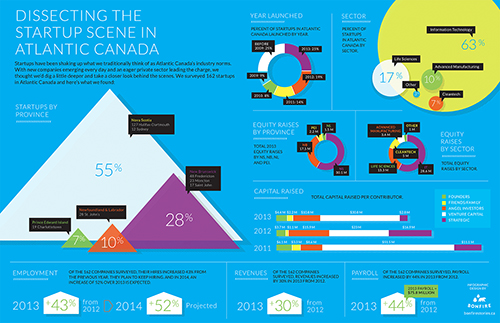Startups are becoming a force in the Atlantic Canadian economy, creating about 3,000 direct jobs and increasing employment by about 40 per cent annually.
Those are the main findings of a survey of Atlantic Canadian startups — defined as locally owned companies commercializing propriety technology for the global market — conducted in January and February by Entrevestor. The results are released today in the Entrevestor Intelligence report that you can find here and which will be on out site permanently.
The findings indicate the growth in startups in the region in the past three years has created about 15,000 direct and indirect jobs. These jobs are being supported by increasing revenues at these companies, and a steady stream of investment into them.
Here’s how we arrived at those numbers. We sent surveys out to 290 startups across the region — every one that we knew of. We received 162 responses, and were able to supplement these responses with information drawn from interviews.
The best data set we got was in employment. The 162 startups that responded told us that they had 1,453 employees as of Dec. 31, 2013, up 43 per cent from 1,019 a year earlier. The astonishing part of this is how quickly these young companies are adding employees. By contrast, data from Statistics Canada show that overall employment in Atlantic Canada increased just 0.3 per cent in 2013.
These companies are also planning to keep growing, forecasting an increase in their workforce by as much as 52 per cent this year. The market for programmers and business development specialists is really tight right now, so it would be miraculous if they actually meet these hiring goals. But the high number indicates the opportunities and optimism in the startup world.
Supplementing the survey results with other information we’ve gathered, we concluded that there were about 3,000 Atlantic Canadians directly employed by startups and by former startups that were bought out by larger corporations.
Research by Enrico Moretti of the University of California at Berkley shows that each high-tech job creates 4.3 indirect jobs due to professional services, taxes and individual spending. Notice that Moretti said “high-tech” jobs, but I believe his ratio should apply to jobs in other startup sectors, such as life sciences and clean technology.
Our survey found that the average salary with an IT startup — devised by dividing the total payroll by the number of employees — was $52,000. But the average salary was $55,200 in life sciences and $56,300 in cleantech. These three sectors accounted for 88 per cent of the startups in the region.
So obviously, startups are producing high enough payroll that Moretti’s ratio should apply across the whole community. That would mean that as many as 15,000 direct and indirect jobs are attributable to the startup boom.
What’s driving this job growth? The companies that revealed revenue (some chose not to) showed that sales at the startups increased 30 per cent last year. And investors continue to back the startups. Venture capital investment in the region increased to $30.8 million from $23 million, driven mainly by a huge increase in funding from institutions based outside the region.
One final note: this is a very young sector. Sixty-seven of the companies were launched last year, and 58 per cent are less than three years old. Assuming a critical mass of these companies can find the capital, customers and employees they need, there are excellent prospects that the growth will continue. We’re at the early stages of something exciting.
Please take the time to read the Intelligence report. It’s rich in data about our community, and also has some great features on the Industrial Internet segment and the movement to teach kids coding. We’ll be featuring its stories on the site in the next few weeks.
Huge thanks to Lise Hansen, Allan and Donna Gates at Bonfire Communications in Saint John for the infographic, and to Roxanna Boers on the splendid layout.










